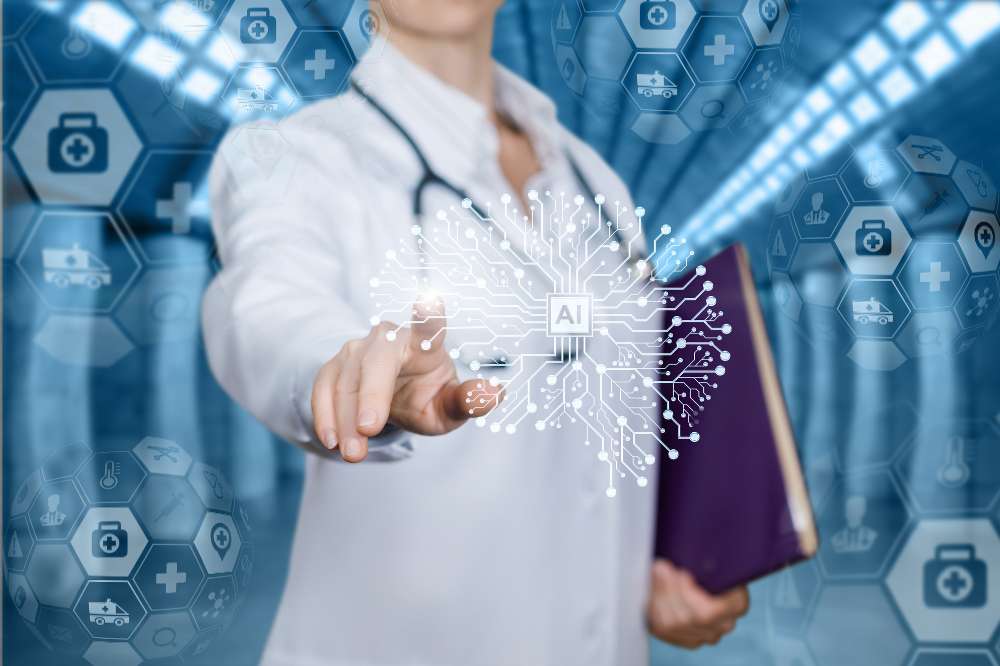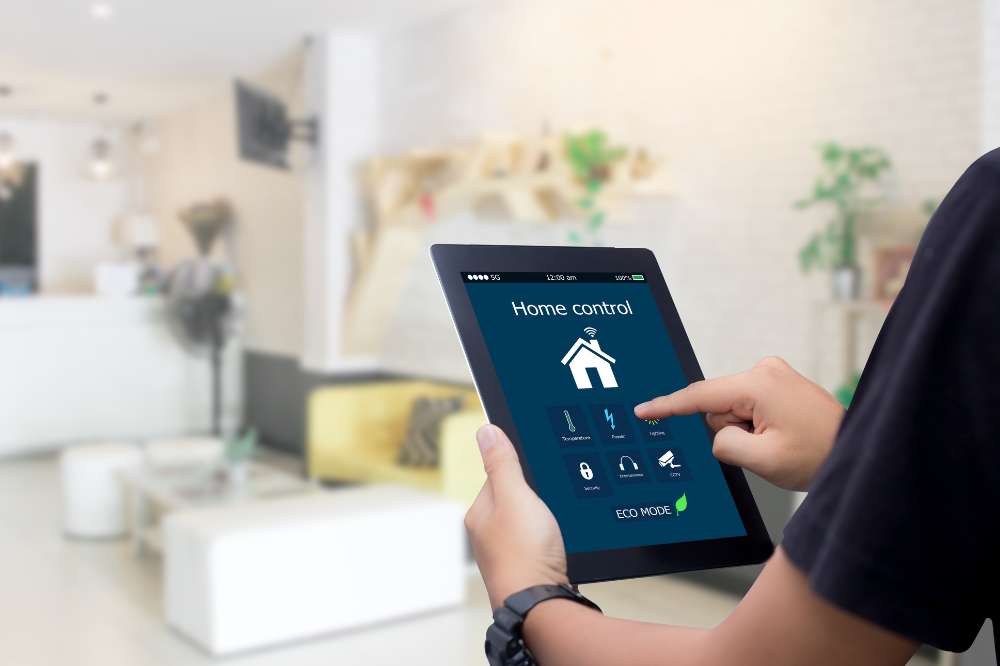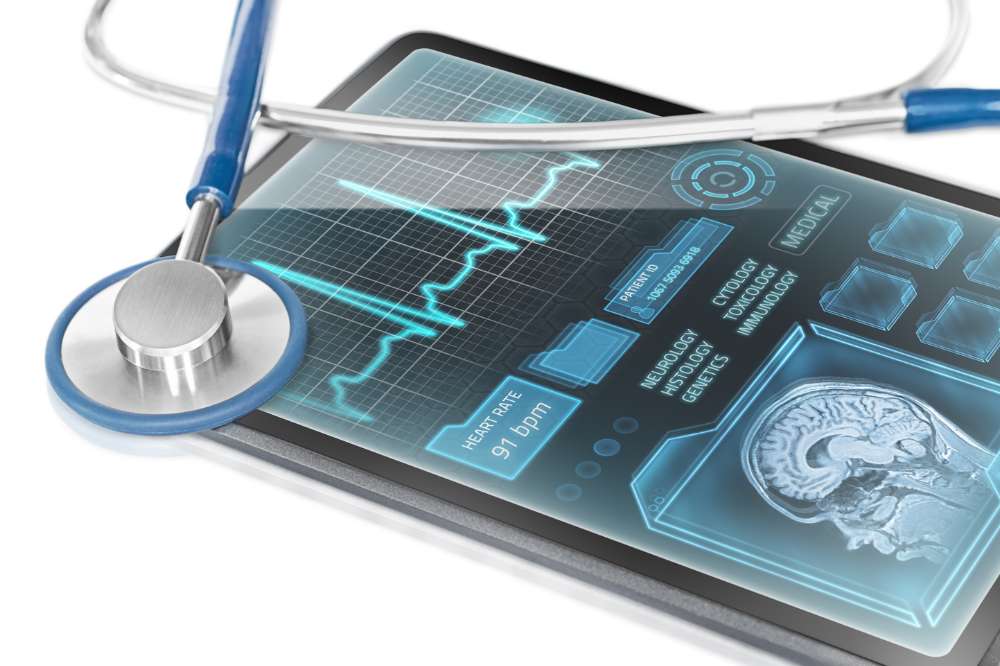Are you looking for the best article on the future of artificial intelligence in healthcare? Stuck finding the best one?
Look no further. In this article, we will delve into the profound impact of AI on the future of healthcare, exploring key areas such as patient diagnosis, healthcare automation, emerging medical technology trends, ethical considerations, drug discovery, and promising innovations that lie ahead.
But first, let’s start with the basics.
1. Introduction

- Compatible with major cable internet providers including Xfinity, Spectrum, Cox and more. NOT compatible...
- [Compatibility] 12V Power Supply Adapter Compatible with Netgear, Linksys, Asus,Motorola, Motorola/Arris...
1.1 Definition of Artificial Intelligence in Healthcare
Artificial Intelligence (AI) in healthcare refers to the application of advanced computational algorithms, machine learning, and data analytics to interpret, analyze, and leverage vast sets of medical data for enhanced decision-making and improved patient outcomes. At its core, AI in healthcare seeks to replicate and augment human intelligence, enabling machines to perform tasks that traditionally require human cognition, such as data analysis, pattern recognition, and decision-making processes.
In the context of healthcare, AI encompasses a broad spectrum of applications, ranging from diagnostic assistance and treatment planning to administrative tasks and personalized medicine. One key facet of AI in healthcare is its ability to process and interpret complex medical information, including medical images, electronic health records, genomic data, and real-time patient monitoring.
Machine learning, a subset of AI, plays a pivotal role by enabling algorithms to learn from data patterns, continuously improving their performance without explicit programming. This adaptability is particularly valuable in healthcare, where the evolving nature of medical knowledge and the increasing volume of patient data demand dynamic solutions.
The transformative potential of AI in healthcare is underscored by its capacity to optimize clinical workflows, enhance diagnostic accuracy, and contribute to the discovery of novel therapies. By leveraging AI, healthcare providers can not only streamline operational processes but also deliver more personalized and effective care, ushering in a new era of precision medicine and improved patient outcomes. As AI technologies continue to evolve, their integration into healthcare holds the promise of revolutionizing medical practices and fostering a more efficient, data-driven, and patient-centric healthcare ecosystem.
1.2 Importance and Impact on Patient Care
The integration of Artificial Intelligence (AI) into healthcare has profound importance and a transformative impact on patient care. AI’s ability to analyze vast amounts of medical data swiftly and accurately equips healthcare providers with invaluable insights for enhanced decision-making. This results in quicker and more precise diagnoses, leading to timely interventions and improved patient outcomes.
Moreover, AI contributes to the personalization of treatment plans by considering individual patient characteristics, medical histories, and genetic factors. This tailoring of care ensures a more targeted and effective approach, minimizing adverse effects and optimizing therapeutic benefits. In diagnostic imaging, AI algorithms can detect abnormalities in medical images with heightened accuracy, aiding in the early detection of diseases such as cancer.
The impact on patient care extends beyond diagnostics, encompassing streamlined administrative processes through automation. This allows healthcare professionals to devote more time to direct patient interactions, fostering a more patient-centric approach. AI-driven innovations in remote patient monitoring and predictive analytics further enable proactive healthcare management, preventing complications and reducing hospital readmissions. In essence, the incorporation of AI into healthcare not only enhances the efficiency of medical practices but fundamentally improves the quality and individualization of patient care, marking a pivotal advancement in the healthcare landscape.
2. AI in Patient Diagnosis
2.1 Current Challenges in Diagnosing and Treating Diseases
Despite the significant strides made in medical diagnostics, challenges persist in accurately diagnosing and treating diseases, prompting the integration of Artificial Intelligence (AI) as a transformative solution. One major challenge is the sheer volume and complexity of medical data, which often overwhelms traditional diagnostic methods. AI addresses this by efficiently processing vast datasets, discerning subtle patterns, and providing more nuanced insights into diseases.
Another challenge lies in the potential for human error in manual diagnosis. AI serves as a powerful complement by offering consistent and objective evaluations, reducing the risk of misinterpretation, and enhancing diagnostic accuracy. Additionally, the shortage of healthcare professionals in certain regions poses a challenge to timely diagnostics. AI applications, such as diagnostic chatbots and telemedicine platforms, bridge this gap by offering preliminary assessments and expanding access to healthcare services, especially in underserved areas.
Furthermore, diseases with complex and multifactorial origins, such as certain cancers, demand intricate diagnostic approaches. AI algorithms excel in identifying intricate patterns within diverse datasets, enabling the identification of early-stage diseases and predicting disease progression. Despite these challenges, the integration of AI in patient diagnosis holds great promise in overcoming these hurdles, revolutionizing the diagnostic landscape, and ultimately improving the efficiency and effectiveness of disease identification and treatment.
2.2 Role of AI in Enhancing Diagnostic Accuracy
The role of Artificial Intelligence (AI) in enhancing diagnostic accuracy represents a paradigm shift in the field of patient diagnosis. AI applications contribute significantly by leveraging advanced algorithms and machine learning to analyze complex medical data, empowering healthcare professionals with unprecedented precision.
One key aspect of AI’s role is its ability to discern subtle patterns and abnormalities within medical images, such as radiological scans and pathology slides. Machine learning models, trained on extensive datasets, excel in recognizing nuances that may evade the human eye. This heightened sensitivity results in earlier and more accurate identification of diseases, including cancers, facilitating timely interventions and improving patient outcomes.
Moreover, AI aids in risk stratification, predicting the likelihood of diseases and assessing the severity of conditions based on individual patient data. This personalized approach ensures tailored treatment plans, optimizing therapeutic interventions and minimizing unnecessary procedures.
Diagnostic accuracy is further enhanced through the continuous learning capabilities of AI algorithms. As these systems encounter new data and cases, they refine their understanding, adapting to evolving medical knowledge and ensuring ongoing improvements in accuracy.
In essence, the integration of AI into patient diagnosis elevates the precision and efficiency of healthcare practices, offering a transformative approach that not only complements the skills of healthcare professionals but also redefines the standards of accuracy in disease detection and assessment.
2.3 Case Studies and Examples
Several compelling case studies and examples highlight the tangible impact of Artificial Intelligence (AI) in enhancing diagnostic accuracy, showcasing the potential of these technologies to revolutionize patient care.
In the field of radiology, Google’s DeepMind has demonstrated exceptional proficiency. In a landmark case, DeepMind’s AI algorithms were employed to analyze retinal scans for diabetic retinopathy, a leading cause of blindness. The AI system exhibited accuracy comparable to expert ophthalmologists, showcasing its potential to expedite the diagnosis of this condition and prevent vision loss.
IBM’s Watson for Oncology is another noteworthy example. This AI system analyzes vast datasets, including medical literature and patient records, to provide oncologists with evidence-based treatment recommendations. In a study conducted in India, Watson for Oncology demonstrated alignment with expert oncologists in suggesting personalized cancer treatment plans, underscoring the potential for AI to assist in complex decision-making processes.
Additionally, PathAI, an AI-powered pathology platform, has shown promise in revolutionizing diagnostic pathology. By aiding pathologists in analyzing pathology slides, PathAI enhances accuracy in cancer diagnosis. This collaborative approach between pathologists and AI showcases how these technologies can synergize to achieve more accurate and efficient disease identification.
These case studies exemplify how AI applications are making significant strides in diagnostic accuracy, offering concrete evidence of their potential to augment healthcare professionals and significantly improve patient outcomes.
3. Healthcare Automation
3.1 Streamlining Administrative Processes with AI
The integration of Artificial Intelligence in healthcare extends beyond clinical settings to streamline administrative processes, marking a transformative shift in the efficiency and operational dynamics of healthcare organizations. AI’s role in administrative tasks not only enhances workflow efficiency but also allows healthcare professionals to focus more on patient care.
One significant application of AI in healthcare administration is the implementation of Robotic Process Automation (RPA). AI-driven bots are designed to automate repetitive and rule-based tasks, such as data entry, claims processing, and appointment scheduling. This not only reduces the burden on administrative staff but also minimizes the likelihood of errors, improving the overall accuracy and reliability of administrative processes.
Moreover, AI contributes to the optimization of resource allocation and inventory management. Predictive analytics, a subset of AI, assists in forecasting patient admissions, ensuring that healthcare facilities are adequately staffed and well-equipped to meet patient needs. This proactive approach mitigates resource shortages and enhances the overall responsiveness of healthcare organizations.
AI-driven chatbots and virtual assistants are also playing a crucial role in patient engagement and communication. These tools streamline the appointment scheduling process, provide quick responses to routine patient inquiries, and facilitate the dissemination of essential healthcare information. This not only enhances patient experience but also frees up valuable time for healthcare professionals to engage in more complex and personalized interactions.
In essence, the incorporation of AI in administrative processes signifies a paradigm shift in healthcare management. By automating routine tasks and optimizing resource utilization, AI allows healthcare organizations to allocate more time and resources towards patient-centric activities, ultimately fostering a more efficient, responsive, and patient-focused healthcare ecosystem.
3.2 Robotics and Automation in Healthcare Facilities
Robotics and automation have emerged as pivotal components in the evolution of healthcare automation, significantly transforming operations within healthcare facilities. The integration of robotics introduces a new era of efficiency, precision, and reliability, particularly in tasks that demand a high degree of accuracy.
One notable application of robotics in healthcare is in surgical procedures. Robotic-assisted surgeries, such as those performed with the da Vinci Surgical System, empower surgeons with enhanced dexterity and control. These systems enable minimally invasive procedures, resulting in reduced recovery times, less postoperative pain, and improved patient outcomes.
Automation extends beyond the operating room into logistics and supply chain management. Autonomous robotic systems are increasingly utilized for tasks like medication delivery, inventory management, and materials transportation within healthcare facilities. This not only accelerates the distribution of medical supplies but also minimizes the risk of human error in logistical processes.
In laboratories, robotic automation streamlines sample processing and analysis. Automated robotic systems can handle repetitive tasks, such as sample sorting and pipetting, with high precision and consistency. This not only expedites laboratory workflows but also ensures accurate and reproducible results, contributing to the overall quality of patient care.
The integration of robotics and automation in healthcare facilities exemplifies a commitment to optimizing processes, enhancing patient care, and advancing medical practices. As these technologies continue to evolve, their potential to revolutionize various aspects of healthcare automation remains a promising and dynamic frontier.
3.3 Benefits of Automation for Hospitals and Patients
The implementation of automation in healthcare yields multifaceted benefits for both hospitals and patients, fostering a more efficient, error-resistant, and patient-centered healthcare environment.
For hospitals, automation significantly enhances operational efficiency. Automated systems streamline administrative tasks, including billing, appointment scheduling, and data entry, reducing the administrative burden on staff and minimizing the potential for human errors. This not only results in cost savings but also allows healthcare professionals to redirect their focus towards patient care and complex decision-making.
In addition to administrative improvements, automation optimizes resource utilization in healthcare facilities. Predictive analytics and automated inventory management systems help hospitals forecast patient admission rates and maintain appropriate levels of medical supplies. This proactive approach prevents shortages, reduces waste, and ensures that healthcare facilities are well-prepared to meet patient needs.
Patients, in turn, experience several advantages. Faster and more accurate administrative processes translate to reduced waiting times and improved overall healthcare experiences. Automated appointment reminders and virtual assistants enhance communication, empowering patients with timely information and facilitating a more engaged and informed healthcare journey.
Furthermore, the integration of automation in diagnostic processes, such as AI-driven imaging analysis, contributes to quicker and more precise diagnoses. This not only expedites treatment initiation but also improves patient outcomes by enabling healthcare professionals to intervene at earlier stages of diseases.
In essence, the benefits of automation extend beyond operational enhancements, positively impacting the patient experience and overall quality of care in healthcare facilities. The synergy between technology and healthcare in the form of automation holds great promise for shaping a more effective, patient-centric, and responsive healthcare landscape.
4. Medical Technology Trends
4.1 Overview of Emerging Technologies
The landscape of healthcare is witnessing a rapid evolution with the integration of emerging technologies that promise to redefine medical practices and patient care. Several transformative trends are shaping the future of healthcare, enhancing diagnostics, treatment options, and overall healthcare delivery.
One key trend is the convergence of Artificial Intelligence (AI) with wearable devices. Wearable technologies equipped with AI algorithms can continuously monitor various physiological parameters, providing real-time health insights. For instance, smartwatches can track vital signs, detect irregularities, and even alert users and healthcare professionals to potential health issues. This integration not only facilitates early intervention but also empowers individuals to proactively manage their health.
Telemedicine, another pivotal trend, has gained prominence, especially in the context of global healthcare accessibility. Advances in telehealth technologies enable remote patient monitoring, virtual consultations, and digital health platforms. This not only expands healthcare access to underserved populations but also facilitates ongoing patient engagement and personalized care.
Innovations in genomics and precision medicine represent a paradigm shift in healthcare. The ability to analyze an individual’s genetic makeup enables healthcare professionals to tailor treatment plans based on specific genetic markers, maximizing treatment efficacy and minimizing adverse effects. CRISPR-based gene editing technologies further open avenues for targeted therapeutic interventions and potential cures for genetic disorders.
Moreover, the Internet of Medical Things (IoMT) is revolutionizing patient care by connecting medical devices and healthcare systems through interconnected networks. This interconnectedness facilitates real-time data sharing, remote monitoring, and improved coordination among healthcare providers.
As these emerging technologies continue to mature, the healthcare landscape is poised for a profound transformation, promising more personalized, accessible, and efficient care. These trends represent not only the future of healthcare but also the potential to revolutionize patient outcomes and the overall healthcare experience.
4.2 Integration of AI with Wearable Devices
The integration of Artificial Intelligence (AI) with wearable devices stands at the forefront of medical technology trends, promising a revolutionary shift in personalized healthcare and continuous health monitoring. Wearable devices, ranging from smartwatches to fitness trackers, are now equipped with sophisticated sensors and AI algorithms, transforming them into powerful tools for health assessment and management.
AI’s role in wearables extends beyond basic data collection, as it empowers these devices to interpret and analyze health-related information. Machine learning algorithms embedded in wearables can discern patterns in physiological data, such as heart rate, sleep patterns, and activity levels. This not only provides users with real-time insights into their health but also enables early detection of anomalies and potential health issues.
For instance, AI-enhanced wearables can alert users to irregular heartbeats, changes in sleep quality, or deviations from baseline activity levels. Such proactive monitoring facilitates timely intervention and empowers individuals to make informed decisions about their health. Healthcare professionals can also benefit from this integration by receiving comprehensive, continuous data that aids in remote patient monitoring and the management of chronic conditions.
As the synergy between AI and wearable devices continues to evolve, these technologies hold the potential to revolutionize preventive healthcare, offering a proactive and personalized approach to well-being that goes beyond traditional episodic care. This trend represents a significant step toward a more data-driven, accessible, and individualized healthcare future.
4.3 Telemedicine and Remote Patient Monitoring
Telemedicine and remote patient monitoring have emerged as transformative medical technology trends, reshaping the healthcare landscape and enhancing accessibility to healthcare services. This dynamic duo leverages advanced communication technologies to facilitate virtual consultations, monitor patient health remotely, and improve overall healthcare delivery.
Telemedicine, characterized by virtual consultations and digital health platforms, enables patients to connect with healthcare professionals regardless of geographical distances. This trend has gained significant momentum, particularly in remote or underserved areas, providing individuals with access to medical expertise without the need for physical visits. Video consultations, secure messaging, and virtual care platforms enhance patient-physician communication, ensuring continuity of care and reducing barriers to healthcare access.
Complementing telemedicine is the rise of remote patient monitoring (RPM), where wearable devices and sensors collect real-time health data from patients in their everyday environment. This continuous stream of data includes vital signs, activity levels, and other relevant metrics. AI algorithms analyze this information, enabling healthcare professionals to remotely monitor patients with chronic conditions, detect early warning signs, and intervene proactively.
Together, telemedicine and remote patient monitoring empower patients to actively participate in their healthcare while offering healthcare providers a comprehensive and continuous view of patient health. These technologies not only enhance healthcare access but also contribute to preventive care, early intervention, and improved management of chronic conditions, ultimately fostering a more patient-centric and efficient healthcare ecosystem.
5. Ethical Considerations and Challenges
5.1 Privacy Concerns with AI in Healthcare
Privacy concerns with Artificial Intelligence in healthcare have become a prominent ethical consideration as these technologies become deeply integrated into medical practices. The vast amount of sensitive patient data processed by AI systems, ranging from electronic health records to genomic information, raises significant challenges regarding confidentiality, security, and the potential misuse of personal health information.
One primary concern revolves around data breaches and unauthorized access to health records. As AI algorithms rely on large datasets to train and improve their performance, protecting the privacy of this data is crucial. Healthcare institutions and AI developers must implement robust cybersecurity measures to safeguard patient information, ensuring that unauthorized individuals cannot exploit vulnerabilities in the system.
Moreover, the risk of re-identification poses a substantial ethical challenge. Even when anonymized, health data can sometimes be linked back to individuals through cross-referencing with other datasets. Striking the right balance between sharing data for research purposes and protecting patient identities is a delicate ethical consideration that requires stringent policies and safeguards.
5.2 Balancing Technological Advancements with Ethical Standards
Balancing technological advancements with ethical standards is a paramount consideration in the integration of Artificial Intelligence (AI) into healthcare. While the potential benefits of AI are immense, ethical guidelines must be rigorously upheld to ensure patient safety, privacy, and the equitable distribution of healthcare resources.
One critical aspect involves maintaining transparency in the development and deployment of AI technologies. Open communication about how algorithms function, the sources of training data, and the intended applications are essential for building trust among healthcare professionals and patients. This transparency allows stakeholders to understand the limitations and potential biases of AI systems, fostering accountability.
In navigating the evolving landscape of AI in healthcare, a commitment to upholding ethical standards is integral to harnessing the full potential of these technologies while safeguarding the well-being and rights of patients. The iterative dialogue between technological innovation and ethical reflection is central to shaping a healthcare future that is both technologically advanced and ethically sound.
6. AI in Drug Discovery and Development
6.1 Accelerating Drug Discovery Processes
AI’s contribution to drug discovery is marked by its ability to analyze vast and complex datasets, providing unprecedented insights into the intricacies of biological systems.
One key area where AI excels is target identification. AI algorithms can sift through extensive biological data to pinpoint potential drug targets with a high likelihood of efficacy. This streamlines the early stages of drug discovery, expediting the selection of promising candidates for further investigation.
Moreover, AI plays a pivotal role in the prediction of drug interactions and adverse effects. By analyzing molecular structures, biological pathways, and historical drug data, AI models can anticipate potential side effects and guide researchers for safer and more effective drug candidates.
In silico drug screening is another realm where AI demonstrates remarkable efficiency. Machine learning algorithms can analyze molecular interactions, predict binding affinities, and assess the pharmacokinetic properties of compounds, aiding researchers in selecting lead compounds for experimental validation. This accelerates the screening process and increases the likelihood of identifying novel drug candidates.
Furthermore, AI enhances the optimization of drug development pipelines by analyzing real-world patient data to tailor treatments based on individual responses. This personalized medicine approach ensures that drugs are more effective and have a higher chance of success in clinical trials. The amalgamation of AI in drug discovery not only expedites the traditionally time-consuming process but also holds the promise of uncovering novel therapeutic avenues.
6.2 Personalized Medicine and Treatment Plans
Artificial Intelligence (AI) is propelling the evolution of drug discovery and development towards personalized medicine, tailoring treatment plans based on individual patient characteristics and genetic makeup. This paradigm shift is transforming how pharmaceutical interventions are conceptualized, designed, and implemented.
AI’s role in personalized medicine begins with its ability to analyze vast datasets, encompassing genetic information, molecular profiles, and clinical records. Machine learning algorithms process this wealth of information to identify patterns and correlations, enabling the identification of genetic markers associated with specific diseases.
Through AI-driven genomics, researchers can pinpoint genetic variations that influence drug responses, allowing for the development of targeted therapies. This approach ensures that treatment plans are not only more effective but also minimize adverse effects by aligning with the patient’s unique genetic predispositions.
Furthermore, AI contributes to the optimization of clinical trial designs by identifying patient subpopulations most likely to respond positively to specific treatments. This targeted approach not only expedites the drug development process but also enhances the likelihood of successful clinical outcomes.
In practical terms, AI in personalized medicine enables healthcare professionals to tailor drug prescriptions, dosages, and treatment regimens to individual patients. This precision medicine approach improves therapeutic efficacy, reduces the risk of adverse reactions, and maximizes overall patient outcomes
6.3 Impact on the Pharmaceutical Industry
The integration of Artificial Intelligence (AI) into drug discovery and development has brought about a transformative impact on the pharmaceutical industry, reshaping traditional approaches and enhancing efficiency across the entire drug development lifecycle.
One of the most significant impacts is the acceleration of research and development processes. AI expedites target identification, in silico drug screening, and the optimization of lead compounds, considerably reducing the time and resources required for early-stage drug discovery. This acceleration not only brings potential cost savings but also allows pharmaceutical companies to bring novel therapies to market more rapidly.
Moreover, AI contributes to the reduction of attrition rates in clinical trials. By identifying patient subpopulations that are more likely to respond positively to specific treatments, AI helps design more targeted and successful clinical trials. This not only enhances the chances of regulatory approval but also streamlines the overall drug development process.
The precision and personalization introduced by AI also have implications for market access and commercialization strategies. Pharmaceutical companies can tailor their marketing and distribution approaches based on the specific patient populations likely to benefit from their drugs, potentially leading to more targeted and effective market penetration.
In essence, AI’s impact on the pharmaceutical industry extends beyond scientific advancements to encompass operational efficiency, cost-effectiveness, and strategic decision-making. As the industry continues to embrace AI technologies, it is poised to navigate drug discovery and development with greater agility, responsiveness, and success.
7. Future Prospects and Innovations
7.1 Predictions for the Next Decade
The next decade holds unprecedented promise for the continued evolution of Artificial Intelligence in healthcare, with transformative innovations set to reshape the landscape of patient care and medical practices.
Firstly, the convergence of AI with emerging technologies is expected to redefine the boundaries of what is achievable. Integrating AI with quantum computing could unlock unparalleled computational power, enabling more complex analyses of biological data, accelerating drug discovery, and advancing our understanding of intricate biological processes.
Moreover, the widespread adoption of AI in genomics is anticipated to usher in an era of truly personalized medicine. The ability to decipher and interpret vast genomic datasets will enable healthcare professionals to tailor treatment plans with unparalleled precision, accounting for individual genetic variations and optimizing therapeutic outcomes.
In diagnostics, AI is poised to extend its reach to a broader array of medical specialties. From neurology to dermatology, AI applications will become increasingly proficient at analyzing diverse datasets, aiding in the early detection and diagnosis of a wide range of diseases.
Telemedicine is expected to undergo further enhancements, with AI-powered virtual health assistants offering more sophisticated diagnostics and treatment recommendations during remote consultations. This not only improves the accessibility of healthcare but also empowers individuals to actively participate in their health management.
Ethical considerations and regulatory frameworks are likely to evolve in tandem with AI advancements. Stricter guidelines and enhanced transparency are expected to govern the development and deployment of AI technologies, addressing concerns related to privacy, bias, and accountability.
As we step into the next decade, the collaborative synergy between technological innovation, healthcare expertise, and regulatory foresight is poised to shape a future where AI contributes decisively to a more personalized, accessible, and effective healthcare ecosystem.
7.2 Potential Breakthroughs in AI and Healthcare
Anticipating potential breakthroughs, the synergy between Artificial Intelligence (AI) and healthcare is poised to redefine the boundaries of medical innovation. One groundbreaking area is AI’s potential to unravel the complexities of neurodegenerative diseases. Advanced AI algorithms, coupled with sophisticated imaging techniques, could enable early detection of conditions like Alzheimer’s and Parkinson’s, allowing for interventions before significant neurological damage occurs.
The intersection of AI and robotics holds promise for robotic-assisted surgeries to reach new frontiers. AI-powered robotic systems, with enhanced cognitive capabilities, may offer surgeons unprecedented precision, transforming complex procedures and minimizing invasiveness. This could lead to quicker recovery times and improved patient outcomes.
In the realm of drug discovery, AI is likely to catalyze breakthroughs by predicting novel drug interactions and potential repurposing of existing medications. Virtual drug screening powered by AI could expedite the identification of therapeutic compounds, potentially accelerating the development of treatments for a myriad of diseases.
AI’s integration with predictive analytics is expected to revolutionize preventive healthcare. By analyzing diverse data sources, including genetic information, lifestyle patterns, and environmental factors, AI can predict an individual’s susceptibility to certain diseases and recommend personalized preventive measures.
Furthermore, the synthesis of AI and virtual reality may redefine patient engagement and therapy. Virtual reality platforms, guided by AI algorithms, could offer immersive and personalized therapeutic experiences, particularly beneficial in mental health treatments.
These potential breakthroughs underscore the transformative impact AI is poised to have on healthcare, offering innovative solutions that could redefine diagnostics, treatments, and the overall patient experience in the years to come.
7.3 Collaborations between Tech and Healthcare Industries
The next decade is poised to witness an era of unprecedented collaborations between the technology and healthcare industries, fostering synergies that will drive innovation, improve patient outcomes, and shape the future of healthcare delivery. One notable area of collaboration is the continued integration of big tech companies, such as Google, Microsoft, and Apple, with healthcare institutions.
Tech giants are leveraging their expertise in data analytics, cloud computing, and artificial intelligence to enhance healthcare infrastructure. Collaborations like the partnership between tech companies and healthcare systems are expected to yield innovative solutions for medical imaging analysis, electronic health record management, and predictive analytics, ultimately improving diagnostic accuracy and treatment outcomes.
Additionally, partnerships between pharmaceutical companies and technology firms are likely to intensify, with shared goals of accelerating drug discovery and optimizing clinical trials. The infusion of advanced analytics and AI into pharmaceutical R&D processes holds the potential to revolutionize the identification of therapeutic candidates and bring about more efficient and cost-effective drug development.
Furthermore, collaborations between startups specializing in healthcare technologies and established healthcare providers are anticipated to yield novel solutions for patient care. Startups focusing on wearables, telemedicine, and personalized medicine are poised to play a pivotal role in shaping the future of healthcare, with the support and collaboration of established healthcare institutions.
These collaborative efforts signify a paradigm shift towards a more interconnected and technologically advanced healthcare ecosystem, promising breakthroughs that have the potential to revolutionize patient care, treatment modalities, and the overall efficiency of healthcare delivery.
8. Conclusion
8.1 Recap of AI’s Transformative Role in Healthcare
In retrospect, the transformative role of Artificial Intelligence in healthcare stands as a testament to the profound impact of technological innovation on the medical landscape. Over the past decade, AI has transcended traditional paradigms, reshaping diagnostics, drug discovery, patient care, and the very fabric of healthcare delivery.
One of AI’s hallmark contributions lies in its ability to revolutionize diagnostics. From image analysis in radiology to the interpretation of complex genomic data, AI algorithms have demonstrated a capacity for accuracy and efficiency that complements and augments the skills of healthcare professionals. This has translated into quicker and more precise diagnoses, enabling timely interventions and improving patient outcomes.
The integration of AI into drug discovery and development has accelerated the identification of potential therapeutic compounds, streamlined clinical trials, and ushered in an era of personalized medicine. AI’s predictive analytics and machine learning capabilities have proven instrumental in identifying target candidates, predicting drug interactions, and optimizing treatment plans tailored to individual genetic variations.
AI’s impact extends beyond clinical domains to administrative processes, automating routine tasks, enhancing resource allocation, and improving patient engagement.
As we look ahead, the collaborative efforts between the technology and healthcare industries, coupled with ongoing advancements in AI, promise a future where healthcare is not only more technologically advanced but also more patient-centric, accessible, and personalized. The journey of AI in healthcare is a dynamic and evolving narrative, and its transformative influence continues to unfold, promising a healthcare future where innovation and compassion converge for the benefit of individuals and societies worldwide.
8.2 Encouraging Further Research and Development
The transformative impact of AI in healthcare heralds a new era of possibilities, but it is imperative to emphasize the importance of continued research and development to unlock its full potential. Encouraging further exploration and innovation in AI applications within healthcare is crucial for addressing existing challenges, refining algorithms, and uncovering novel avenues for improvement.
Firstly, ongoing research is essential for enhancing the interpretability and explainability of AI algorithms. Understanding how these systems arrive at their conclusions is crucial for fostering trust among healthcare professionals and patients, particularly when dealing with critical decisions in diagnostics and treatment planning.
Secondly, there is a need for research into the ethical implications of AI in healthcare. This includes developing frameworks for responsible AI use, addressing bias in algorithms, and ensuring that patient privacy is upheld in the era of data-driven healthcare.
Furthermore, research initiatives should focus on the scalability and integration of AI solutions into diverse healthcare settings. Tailoring AI applications to accommodate the variability in healthcare infrastructure, resources, and patient demographics is essential for ensuring widespread adoption and equitable access to these technologies.
Fostering an environment that encourages and supports further research and development in AI for healthcare is pivotal. The collaborative efforts of researchers, healthcare professionals, technologists, and policymakers will play a vital role in shaping an AI-driven healthcare landscape that is not only innovative but also ethical, transparent, and inclusive. This commitment to ongoing exploration and refinement ensures that AI continues to be a force for positive transformation in the realm of healthcare.





